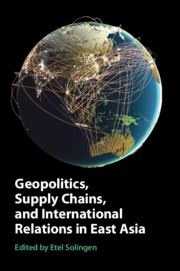‘Once upon a time, trade in goods was conducted in the Ricardian formula of the cloth-wine exchange. A century before Ricardo, Immanuel Kant imagined that with three conditions met, the likelihood of peace would go up: 1) commerce across nations thrives; 2) republican regimes rather than monarchical get predominant; 3) treaties and organizations across nations permeate the earth. Alas, globalization deepening in the new millennium brings about much more complex and uncertain pictures especially in East Asia. Etel Solingen's book has provided tons of exquisite data on global supply chains that with 'trade in tasks' being the mainstay in commerce across nations and across firms, simple geo-politics, single-minded protectionism, and infectious populism, each treated alone, would not be a good answer. A tour de force of Etel Solingen, combining her strength in economics, security studies and East Asian Studies.’
Takashi Inoguchi - Oberlin University and University of Tokyo
‘Etel Solingen brings together a powerful interdisciplinary group of scholars to address global value chains. This timely book advances important debates about technological innovation, geopolitics, and economics. Solingen reimagines interdependence and conflict, illuminating the intricate linkages that connect states and other actors through Global Supply Chains. As a result, the book will spark new research to help us better understand cooperation and conflict in the twenty-first century. In other words, this book unchains us from old disciplinary constraints and shines a bright light on these fundamental questions.’
Katherine Barbieri - University of South Carolina
‘This timely study remaps our political understanding of economic globalization in new, deeply engaging, and thoughtful ways. Led by a scholar whose work has long grappled with economic-security linkages, each chapter gives us grounded perspectives on the role of global supply chains in affecting prospects for interstate conflict and cooperation. Anybody looking to understand where the international relations of Asia is headed should first use this volume to rethink the critical ways global supply chains shape and are reshaped by geopolitics.’
Saadia M. Pekkanen - University of Washington
‘Global supply chains have transformed international trade in the last quarter of a century. Their impact on international cooperation and conflict has largely been neglected, however. This innovative collection fills this gap by examining the impact of value chains on relations among East Asian countries and between them and the United States. It provides the essential foundations for understanding economic tensions in the region in the post-Covid 19 era.’
John Ravenhill - University of Waterloo
‘As debates intensify over the future of US-China trade relations, global supply chains have become a new and controversial face of international economic interdependence. In these original contributions, Etel Solingen and her team of expert authors illuminate the implications of supply chains for international conflict and cooperation, domestic politics, and corporate strategy in the Asia-Pacific region and beyond.’
Miles Kahler - American University
‘An interesting book that deals with an important topic. This volume takes a much needed and relatively unusual approach to global supply chains examining their role in interstate relations and global politics at a varying of levels of aggregation. The focus on East Asia is particularly timely, given the increasing economic and political tensions focused on that region. A wide range of readers will find much of interest here.’
Stephen J. Kobrin - University of Pennsylvania
‘This outstanding collection of essays explores the complex relationships between global supply chains, domestic politics, and international politics in East Asia. Written at a time of intensifying competition in US-China relations and in the midst of a global pandemic, Geopolitics, Supply Chains, and International Relations of East Asia is both timely and innovative.’
Scott Kastner - University of Maryland
‘This book provides a timely evaluation of the GSCs in today’s geopolitical competition. By delineating the evolution of GSCs in Asia over the last several decades and providing a concrete theoretical explanation of the structure of GSCs, this book helps advance our understanding of the relationship between geopolitical tensions and international economic exchanges.’
Dennis L. C. Weng
Source: Journal of Strategic Security



